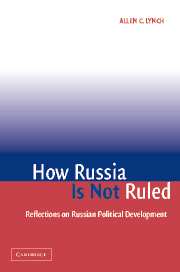Book contents
- Frontmatter
- Contents
- Acknowledgments
- Introduction
- 1 Historical Patterns of Russian Political Development
- 2 Soviet Legacies for Post-Soviet Russia
- 3 The 1990‘s in Russia: A New Time of Troubles?
- 4 Russia's “Neopatrimonial” Political System, 1992–2004
- 5 The Russian 1990s in Comparative Perspective
- 6 What Future for Russia? Liberal Economics and Illiberal Geography
- Conclusions
- Select Bibliography
- Index
4 - Russia's “Neopatrimonial” Political System, 1992–2004
Published online by Cambridge University Press: 14 January 2010
- Frontmatter
- Contents
- Acknowledgments
- Introduction
- 1 Historical Patterns of Russian Political Development
- 2 Soviet Legacies for Post-Soviet Russia
- 3 The 1990‘s in Russia: A New Time of Troubles?
- 4 Russia's “Neopatrimonial” Political System, 1992–2004
- 5 The Russian 1990s in Comparative Perspective
- 6 What Future for Russia? Liberal Economics and Illiberal Geography
- Conclusions
- Select Bibliography
- Index
Summary
I stand above the court!
– Russian President Boris N. Yeltsin, April 1996The long and the short of it is that Russia, after fair and democratic elections in December of 2003, legitimately rejected democracy in favor of an updated authoritarian Soviet-type regime.
– Russian political sociologist Olga KryshtanovskayaIntroduction
It was the first of the two Russian revolutions of 1917 that gave substance to Woodrow Wilson's call for the United States to “make the world safe for democracy” through its intervention in the First World War. The sudden collapse of the Tsarist monarchy and the establishment of a liberal democratic Russian government under the leadership of Alexander Kerensky in the winter of 1917 gave credence to the hopes of American democrats that Allied military victory over Imperial Germany would usher in an age of universal democracy and with it an age of universal peace. The tide of democratic sentiment also flowed westward from the Russian capital Petrograd, where Kerensky's government, anxious to convince its British, French, and now American allies of Russia's newfound democratic allegiance, kept a grieviously weakened Russia engaged in the fourth year of war with Germany and launched ill-conceived offensives that by the summer of 1917 had resulted in the disintegration of the Russian Army as an effective combat force. Sir George Buchanan, the British ambassador in Petrograd, wondered in his diary whether it might not have been prudent of the Western democracies to have withdrawn the military pledges they had extracted from what had become a gravely weak Russia and let the country negotiate its own path out of the war.
- Type
- Chapter
- Information
- How Russia Is Not RuledReflections on Russian Political Development, pp. 128 - 165Publisher: Cambridge University PressPrint publication year: 2005



